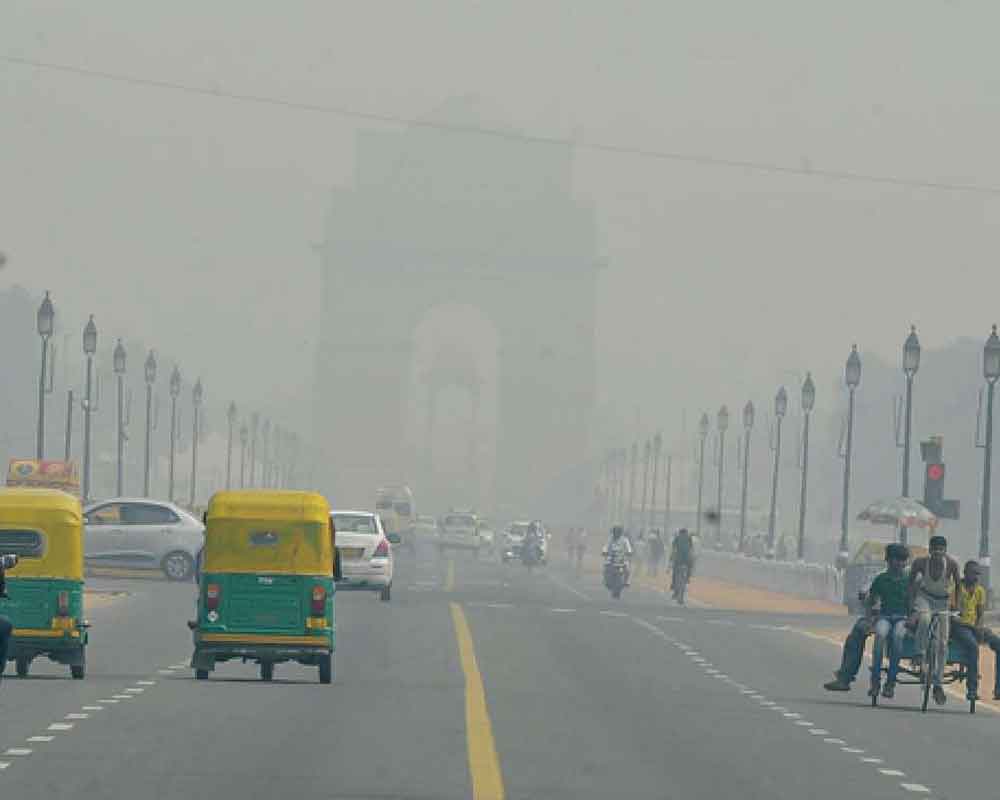


As Delhi recorded an AQI of 493 on November 18, 2024, authorities have directed all schools to move classes online and have tightened restrictions on construction and vehicle movements. The level of PM2.5 in Delhi was 26 times higher than the WHO's limit, leading to the use of an anti-smog gun on a multi-purpose vehicle in an effort to reduce air pollution. With nine stations reporting an AQI of 500, the situation is even worse than the recorded 493.
Delhi's Air Quality Crisis: A Critical Analysis
Introduction
Air pollution has become a major concern in urban areas worldwide, and Delhi, the capital of India, is no exception. In 2024, the city recorded an Air Quality Index (AQI) of 493 on November 18, triggering widespread health and environmental concerns.
Background
Delhi's air pollution problem has been escalating in recent years due to several factors, including:
The situation is exacerbated during winter months when cold air traps pollutants close to the ground.
Recent Developments
On November 18, 2024, Delhi's air quality reached its worst level in years, with an AQI of 493. This prompted the authorities to take immediate action:
Health Impacts
Air pollution has severe health consequences, including:
Children, the elderly, and those with pre-existing health conditions are most vulnerable to the harmful effects of air pollution.
Economic Impacts
Air pollution also has significant economic impacts:
Top 5 FAQs and Answers
1. What is an Air Quality Index (AQI)?
An AQI is a measure of air quality based on the concentration of particulate matter and other pollutants in the air. The AQI ranges from 0 to 500, with higher numbers indicating worse air quality.
2. What is the WHO's recommended level for PM2.5?
The World Health Organization (WHO) recommends an annual average PM2.5 level of 10 micrograms per cubic meter (µg/m³). Delhi's PM2.5 level on November 18, 2024 was 26 times higher than this limit.
3. What is an anti-smog gun?
An anti-smog gun is a device that uses negatively charged water droplets to neutralize particulate matter in the air, reducing air pollution.
4. What are the long-term solutions to Delhi's air pollution problem?
Long-term solutions include:
5. What can individuals do to reduce air pollution?
Individuals can help reduce air pollution by:
Conclusion
Delhi's air pollution crisis is a serious threat to public health, the economy, and the environment. Immediate and long-term measures are needed to address this issue effectively. By working together, government, businesses, and individuals can create a cleaner and healthier future for Delhi.

The Justice Makers Bangladesh in France has strongly criticized the Muhammad Yunus-led interim government of Bangladesh for suppressing freedom of expression and adopting an authoritarian and fascistic path. This condemnation comes after journalist Anis Alamgir was arrested under the country's Anti-Terrorism Act for criticizing the government's human rights violations. The rights body has demanded the immediate and unconditional release of Alamgir and urged the international community to take action to ensure accountability and protect freedom of expression in Bangladesh.

India's remarkable economic transformation and its impact on the world stage is the focus of this e-paper. From the shifting global power dynamics to the rise of Indian businesses, this edition provides a comprehensive look at India's place in the international arena. With insights from experts, analysis of key events, and a spotlight on Indian businesses, this e-paper delivers an in-depth perspective on India's rise as a global powerhouse.

In a historic event, Indian Prime Minister Narendra Modi has been bestowed with Ethiopia's highest honour, 'The Great Honor Nishan of Ethiopia.' He is the first global leader to receive this prestigious award, which recognizes his exemplary leadership and contribution to strengthening India-Ethiopia partnership. In a ceremony held in Addis Ababa, PM Modi expressed his gratitude and dedicated the award to all those who have nurtured the bilateral ties between the two countries. This recognition marks a significant milestone in the positive partnership between India and Ethiopia, and reflects the strong bond between the two nations.

Prime Minister Narendra Modi's two-day state visit to Ethiopia has been warmly welcomed by the country's government and the Indian community. According to Tariku Deressa, CEO of Gandhi Memorial Hospital, the visit will strengthen the ties between the two nations and particularly benefit the medical industry. The cooperation between India and Ethiopia in the medical sector has been significant, with many Ethiopian doctors receiving training in Indian universities and the country importing medical equipment and products to improve the healthcare system. PM Modi's visit will further magnify these efforts and provide new opportunities for collaboration.

Indian Prime Minister Narendra Modi and Jordan's King Abdullah II bin Al Hussein met in Amman to discuss issues of mutual interest and strengthen ties between the two nations. Both leaders discussed the issue of terrorism and extremism, with PM Modi acknowledging King Abdullah II's efforts to promote moderation. The meeting also saw the signing of agreements and MOUs, paving the way for further economic cooperation and partnerships between the two nations. King Abdullah II emphasized the strong partnership and friendship between India and Jordan, expressing his enthusiasm for developing new avenues of collaboration for the benefit of their peoples.

Indian Prime Minister Narendra Modi's first full-fledged bilateral visit to Jordan in 37 years includes a meeting with Jordan's King Abdullah II to review relations and discuss ways to deepen cooperation in various sectors. During the visit, five agreements were signed, highlighting the shared commitment to combating terrorism and increasing trade and investment between the two nations. PM Modi also addressed the India-Jordan Business Forum and is now headed to Ethiopia for a two-day state visit. Follow us on Instagram for updates on Modi's trip.

In an exceptional show of hospitality, Crown Prince Al Hussein Bin Abdullah II personally drove Prime Minister Narendra Modi to the prestigious Jordan Museum. PM Modi shared pictures of the ride with His Royal Highness on social media, expressing his gratitude for the experience. The Jordan Museum is a hub for preserving and sharing the rich cultural heritage of the country, providing education and research opportunities for visitors. As PM Modi concludes his visit to Jordan, he highlighted the fruitful outcomes and strengthened collaboration between the two nations.

A terror attack at Bondi beach in Sydney, Australia has left at least 15 people dead, with 25 others still hospitalized. One of the alleged gunmen was previously investigated by Australia's national security agency, but was not deemed a threat. Vigils were held across the country to honor the victims, while the investigation now focuses on how the attackers were radicalized and the potential role of extremist ideology. The Five Eyes intelligence network will assist in the investigation as the nation's leaders vow to tighten gun laws.

A targeted terror attack on Sydney's Jewish community during Hanukkah celebrations has left at least 15 people dead, including a 10-year-old girl. The shooters have been identified as father and son Sajid and Naveed Akram, with the father being a legally licensed gun owner. His son, who was apprehended at the scene, was reportedly unemployed and a student at a religious institute, but had not been in contact with the owners for years. Police have not confirmed the suspects' nationality or origins.

Naveed and Sajid Akram are the alleged shooters behind the anti-Semitic terror attack at Bondi Beach in Sydney, Australia, which left 16 people dead and dozens injured. Naveed, a bricklayer, had previously been investigated for his support for Islamic State and had a history of boxing. His father, Sajid, was fatally shot during the attack and was known to have legal firearms registered to him. The suspects' Islamic teacher has publicly condemned the attack, revealing that Naveed had been awarded a certificate for mastering the Quran.